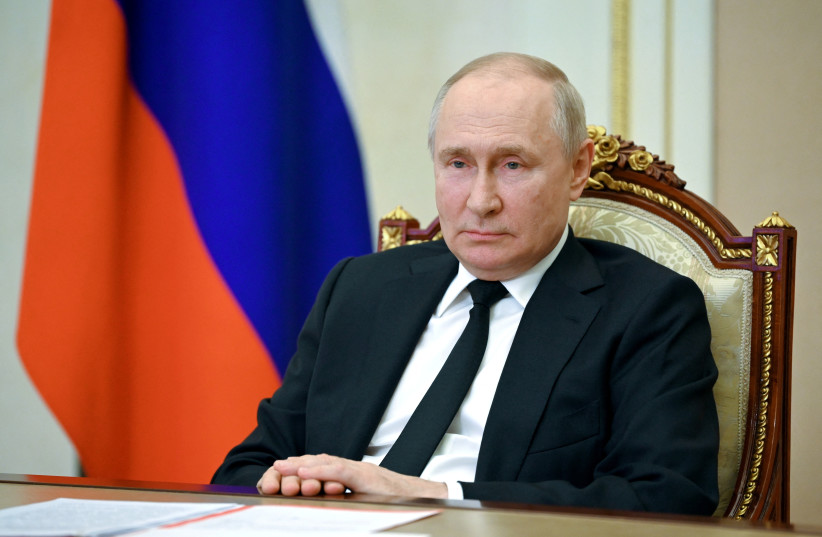Russian President Vladimir Putin’s recent visit to China was the most significant event in international relations of late. It carries profound strategic implications given the weight and standing of these two allies. Moreover, it came right on the heels of Chinese President Xi Jinping’s European tour to France, Serbia, and Hungary.
It is no surprise that American circles view any Chinese-Russian rapprochement with suspicion, seeing it as a step towards fortifying an anti-US alliance. Neither side even tries to hide this anymore. The statistics speak volumes – the Chinese and Russian leaders have met an astonishing 40 times over 15 years of personal dealings dating back to 2009 when Xi was vice president.
And now Putin’s state visit kicks off his fifth presidential term. The reality is that the West is fighting a losing battle against the Russian and Chinese behemoths. It confronts Russia in Ukraine, provoking it militarily to the point of forcing nuclear posturing in Moscow as Western leaders threaten to deploy forces into Ukraine.
Tensions are so high that US President Joe Biden warned of Putin potentially using tactical nuclear weapons, calling it a real danger. As for China, it faces unrelenting accusations of trade practices undermining the global economic order and waves of Western sanctions – the latest being the chip war – aimed at forcing Chinese banks to cut trade ties with Moscow.
Yet Beijing has no intention of abandoning its robust strategic partnership with Russia. In fact, it played economic lifeline after major Western sanctions hit Russia over the 2022 operation in Ukraine, including freezing forex reserves, restricting Western tech access, and expulsion from SWIFT. Even so, the Russian economy rebounded with 3.6% growth in 2023, outpacing the US and Europe.

China also refused to implement Western sanctions, instead becoming Russia’s top importer of fossil fuels and exporter of technologies, chips, drones and all manner of Chinese goods from cars to smartphones. Bilateral trade topped $240 billion, up 25% year-on-year.
This trade buttresses both economies but also deals a body blow to the US dollar as it is conducted in renminbi – official Chinese currency – through opaque Chinese payment systems beyond Western tracking. Washington’s only recourse is more sanctions while lobbing accusations that Beijing aids Moscow’s Ukraine war effort with military supplies.
A key strategic upside for both is fortifying their economies against decoupling from the West should a new multipolar order arise untethered from globalized cooperation and commerce. China adroitly exploits the massive geostrategic vacuum left by America’s near-total absence on the world stage.
Well into his last presidential year, a lame-duck Biden is fixated on the Gaza quagmire, unable to coordinate, reach an understanding, or convince Netanyahu’s government of American viewpoints in this catastrophic conflict.
Meanwhile, Beijing deftly rearranges its global cards, laying groundwork for Trump’s possible return while rebuilding Europe ties – where leaders anxiously eye both Trump’s specter and the Ukraine conflict’s trajectory, fearing Russia’s potential military victory – as Europe finds no leverage over the Kremlin except Chinese mediation.
No limits to China-Russian partnership
Putin hailed the “no-limits” Chinese-Russian partnership poised to affordably and reliably supply the Chinese economy, companies, cities and towns with environmentally friendly energy, light, and heat. He also stressed deepening hi-tech and innovation cooperation by pooling scientific capabilities to stake out global leadership.
While appearing more restrained rhetorically toward the West, framing relations as partnership not alliance, China makes clear its Russia ties target no one but uphold justice, law, and democracy. Yet this calm belies joint efforts undermining Western sanctions via alternative financial architecture and institutions like the Shanghai Cooperation Organization and BRICS.
With relations at an unprecedented level, options include leveraging these blocs against sanctions, opening Eurasian security talks with fellow travelers, and pursuing “dual resistance” to deter Washington’s “dual containment” aimed at obstructing a multipolar reality.
Underscoring US alarm, White House National Security Spokesman John Kirby warned that Russia and China are looking to challenge the international order in ways that contradict the interests of Washington, vowing America’s close monitoring.
The writer is a UAE political analyst and former Federal National Council candidate.
